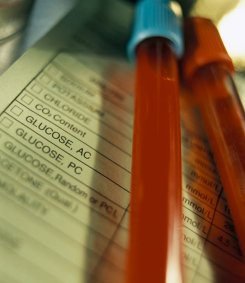 The prostate specific antigen (PSA) test, widely used for detecting prostate cancer, is now all but useless for predicting prostate cancer risk, say Stanford University researchers. A study of prostate tissues collected over 20 years reveals that the test now indicates nothing more than the size of the prostate gland. "The PSA era is over," said Thomas Stamey, professor of urology and lead author of the study appearing in the Journal of Urology. "Our study raises a very serious question of whether a man should even use the PSA test for prostate cancer screening any more."
The prostate specific antigen (PSA) test, widely used for detecting prostate cancer, is now all but useless for predicting prostate cancer risk, say Stanford University researchers. A study of prostate tissues collected over 20 years reveals that the test now indicates nothing more than the size of the prostate gland. "The PSA era is over," said Thomas Stamey, professor of urology and lead author of the study appearing in the Journal of Urology. "Our study raises a very serious question of whether a man should even use the PSA test for prostate cancer screening any more." The PSA test - originally proposed by Stamey in 1987 - measures prostate specific antigen, a protein normally produced by the prostate gland. However, Stamey has come to believe that the PSA test is not a useful predictor of the amount or severity of prostate cancer.
He said elevated levels of that protein actually reflect a condition called benign prostatic hyperplasia (BPH), a non-cancerous increase in prostate size.
Stamey explained the change by noting that the tumors encountered 20 years ago were generally so large they generated PSA levels high enough to provide a reasonably good measure of cancer severity. Now that screening is more commonplace in this country, many cancers are being caught earlier and are usually smaller - not generating enough PSA to be a good indicator of severity.
Stamey explained the basic dilemma as such: men whose PSA levels are above 2 ng/ml frequently undergo biopsy, which will almost always find cancer, but this does not necessarily mean that prostate removal or radiation treatment is required. "What we didn't know in the early years is that benign growth of the prostate is the most common cause of a PSA level between 1 and 10 ng/ml," he said.
To figure out the PSA test's usefulness in determining which cancers warrant radiation or surgery, Stamey and his team set out to document what was actually found following prostate removal, such as the volume and the grade of the cancer - indicators of the cancer's severity. They then compared those findings to aspects that could be determined prior to surgery, such as how many of the cancers could be felt by rectal examination and the patient's blood PSA level. They found that over time, there was a substantial decrease in the correlation between PSA levels and the amount of prostate cancer.
However, the researchers concluded that the PSA test is quite accurate at indicating the size of the prostate gland, meaning that it is a direct measure of BPH. And Stamey pointed out that it is still very useful for monitoring patients following prostate removal as an indicator of residual prostate cancer that has spread to other parts of the body.
"Our job now is to stop removing every man's prostate who has prostate cancer," said Stamey. "We originally thought we were doing the right thing, but we are now figuring out how we went wrong. Some men need prostate treatment but certainly not all of them."
If the PSA test is no longer useful, the question remains as to the best course for detecting prostate cancer. Stamey recommends a yearly digital rectal exam for all men over 50. "If a cancer is felt in the prostate during a rectal examination, it is always a significant cancer and certainly needs treatment," he said. Unfortunately, he added, even large cancers often cannot be felt during rectal examination. Stamey and colleagues are currently working on finding a blood marker that could indicate more aggressive forms of the cancer.

